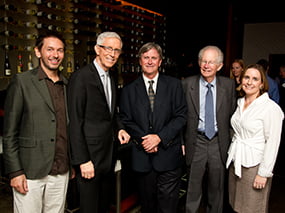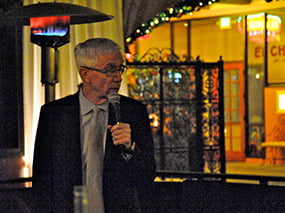The Rose Hills Foundation Fellows gave spectacular presentations at The Huntington Library, Art Collections, and Botanical Gardens. Craig Lund and Cumore Denby spoke on their extremophile bacteria research, Ivy Song and Madeline Mullen presented their findings on exotic botanicals’ potential medicinal applications; and Gilbert Lopez and John Mansell discussed their research on isoprene, which is transformed in the atmosphere and has a significant impact on air quality. Attendees asked questions of each research team and The Rose Hills Foundation President Victoria Rogers congratulated the fellows on their hard work over the last eight months.
The researchers’ mentors: Marc Baum, John Moss, Manjula Gunawardana, and David VanderVelde (Caltech) attended the event. Dr. VanderVelde said, “The Rose Hills Foundation Fellows presented with such detail and polish, they were on par with Caltech students.” Local dignitaries: Pasadena Mayor Bill Bogaard and Bill Thomson, a trustee of Pasadena City College, attended the event in a show of their support as well.
Craig Lund and Cumore Denby’s research centered on isolating DNA from natural tar pools to study the microbial meta-genome in the samples. They found interesting data about the microbial composition of these extreme environments. They also worked on a related project studying organic solvent tolerance of a group of bacteria, mainly extremophiles.
Madeline Mullen and Ivy Song worked on a project in partnership with Huntington Gardens to discover potential therapeutics in exotic plants of the Euphorbia genus. Around 70% of pharmaceuticals come from a plant source which makes this project especially relevant and significant. The process is a long and complex one from extraction and evaporation of plant materials to analysis of their chemical composition.
John Mansell and Gilbert Lopez examined the role of isoprene, a compound emitted naturally by plants, in decreasing air quality. They simulated sun-driven reactions with the use of dust particles that could occur in the atmosphere.






